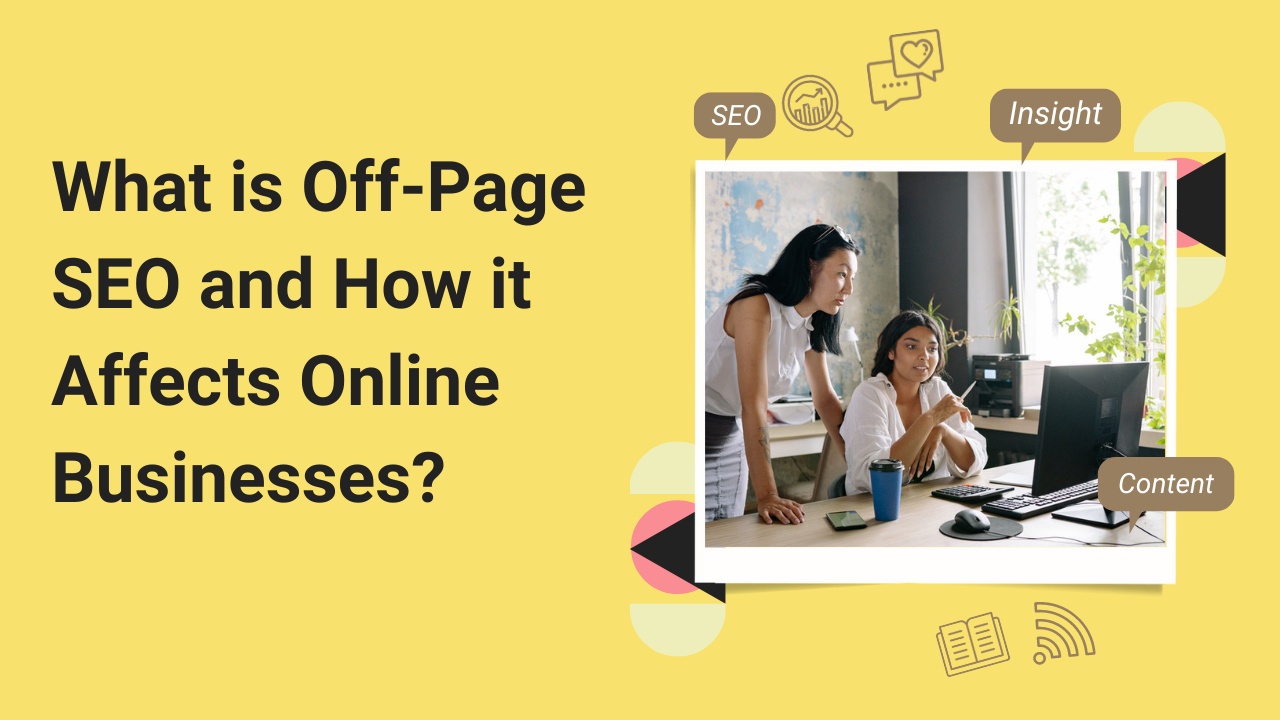
Table of Contents
What are your brand’s visibility and organic search traffic like? How do you rank your website on Google?
Maybe you’ve optimized your webpage to the maximum extent possible. A site structure and internal linking strategy are developed from image optimization and keyword research. However, Google’s rankings still don’t seem to be working for you.
You may not have completed both puzzle pieces because you only worked on half of them. What about the other half?
Digital marketing strategies that are successful must include off-page SEO.
The purpose of this guide is to provide you with a deep understanding of off-page SEO. You will consider what off-page SEO is, why it is so important, what off-site SEO factors are, and the best techniques to use to rank in Google and drive traffic to your site.
What is Off-Page SEO
Off-page SEO (also known as off-site SEO) is the practice of optimizing your website by taking steps outside of your own website. Each of these steps is intended to enhance your ranking in search engine results pages (SERPs).
In summary, off-page SEO begins to take effect after you have already built your website and happens outside of it.
There are a variety of criteria for evaluating the rating of a page. In addition to getting information about your website from sources other than your domain, Google also gets information about your website based on its content and performance. It is for this reason that off-page SEO is so important.
The link-building technique is one of the most effective off-page SEO techniques. Google is based on PageRank, which evaluates a page’s backlinks based on both quantity and quality.
Through off-page SEO, you increase domain reputation, relevance, trustworthiness, and authority while supporting your website efforts (i.e., on-page SEO).
In addition to off-page SEO, other off-page practices such as brand building, citation building, content marketing, social media, local SEO, press releases, podcasts, and influencer marketing are important components of a comprehensive SEO strategy.
To put it simply, off-page SEO includes any services that you use to optimize your website without making any changes to it or adding any content.
Consider this:
On-page SEO is what your website is all about
Off-page SEO = Off-page optimization on another website or platform
Why Off-Page SEO Is Important For Your Business
Digital marketing strategies require off-site SEO to rank well for competitive keywords, which is why it is so important. It is crucial that your website is regarded as an authority if you intend to appear in search engine results for targeted terms. Site authority is built through off-site SEO practices.
It involves determining how individuals and organizations believe about your website, products, and services based on the information provided by other websites and organizations. The goal of optimizing your website for off-page Google search engine optimization should be at the core of your digital marketing plan, as this will boost your credibility, relevance, popularity, and authority, both from a user perspective and from the perspective of search engines.
Nowadays, most people do most of their shopping online. Although your products and services may be great, if you don’t rank well in search engines for the terms that people are searching for, you will have difficulty reaching them. Off-page SEO strategies not only enable you to build a strong reputation but will also help the right people discover your business. As a result, you will see a significant increase in website traffic, which may result in sales.
Moreover, as you can see, off-site SEO plays a crucial role in increasing your business’s authority, reputation, and search engine ranking through specific practices.
Off-page SEO: 3 types of links
Off-page SEO begins with building backlinks. A high number of high-quality backlinks usually results in a higher ranking than an otherwise equal site with limited backlinks.
Natural links manually created links, and self-created links are the three main types of links.
- Natural links are links that naturally appear on a page without the page owner’s involvement. Linking to a favourite produce farm in a food blogger’s post is a natural link.
- Link-building activities are the basis for manually built links. Customers linking to your website and influencers sharing your content are examples of this type of marketing.
- By including a backlink in an online directory or forum, leaving a blog comment signature or attaching an optimized anchor text to a press release, self-created links can be created. You should tread lightly with some of the tactics you’re using to build your links, as they tend to fall into black hat SEO and are frowned upon.
The links that pass the most value, regardless of how they were obtained, generally contribute to SEO efforts the most. Equity gained is associated with many positive signals, such as:
- The popularity of the linked site
- The topical similarity between the linking site and the page being linked to
- Links that are “fresh”
- On the linking site, the anchor text was
- Whether the linked site is trustworthy
- Linking page’s other links
- The domain and the page linking to the domain are authorized
6 factors that influence link value for off-page SEO
- Links to your website using anchor text
- Your site’s age or how fresh the link is
- Page with the most links
- The related subject matter between your website and the linking site
- Whether the linked site is trustworthy
- Links to and from authoritative sites
Optimizing your SEO campaign off-page
1. Building links
By using backlinks, you aim to create natural links from other websites to your website.
You will gain two main advantages from link exchanges with reputable websites: you will drive traffic to your site and your ranking will be improved. You will benefit greatly from links from credible websites.
Linking is the main method of navigating the internet, so these benefits occur naturally. The experience of your users is improved by links. By linking to other information, your users can quickly locate other information they find useful.
The ease of measuring the authority, expertise, and trust of a site can also be obtained through links. Link popularity is one factor Google uses in its search ranking algorithm.
You can attract links to your site, but how do you do that? If you want to start, you can opt to use any (or all) of these search engine optimization approaches.
- Join a professional organization. A local Chamber of Commerce or an industry association could be a good choice. The association’s website should include a link to your company.
- Make content that is of high quality. You can optimize your site to attract clicks and natural links by creating high-quality blog posts, videos, infographics, and more. People usually show up if the event is interesting.
- Send out a message. When you reach out to bloggers or journalists as potential sources for their content or ask them to host something you’ve created, there is an opportunity that will lead you to build links to your website in the future.
- Use social media to spread the word. It is possible to gain traction with your content by promoting it on social media. Provide social media channels with appropriate content, such as infographics and blog posts. Utilize hashtags on Twitter to make your posts more discoverable.
It is not true that all links are equal. A link from an influencer in your audience’s community has much more authority than a link from a spam site, for example.
Google will rank your site higher if you have these high-quality links, which tells it your site knows its material.
You should regularly check your backlinks to determine whether your off-page SEO strategy is performing optimally. Analysis of the backlink profiles of your competitors and you can be achieved using tools. The following tools are among our favorites:
Implementing an off-page SEO strategy requires understanding why you’re building links, not just how to do it. In building these communities, you hope to reach more people and have a stronger presence.
What is the relevance of content to off-page SEO?
There are hundreds of off-page techniques out there, but without quality content, they don’t matter. Users will abandon your page if it doesn’t have value to them, especially if they aren’t able to access your content.
Even if you generate a large number of links, you won’t convert those visitors into customers if there are no compelling features on your website. If you have all the answers to your audience’s questions, you will have to convince them through your content!
Analogously, you can think of your content as the food at a wedding. Your guests will stick around if you have something to offer.
The content on your web page should be good to help catch the attention of users when they land on your page. I consider content as a key component of off-page SEO.
2. Blogging
You can establish your brand’s authority through blogging.
The web doesn’t have any other place where long-form content is as constant as blogs do.
You can start building organic links and brand mentions when your audience learns about your content by commenting on it and sharing it.
Additionally, you will establish yourself as an expert in your field with continuous posts. You will be the first to provide your audience with information about the latest updates and trends, as well as how-to guides and educational articles.
That’s loyalty in action!
3. Marketing through social media
The top places on the web for generating brand awareness are still social media sites even if social media links don’t affect rank.
The main benefits of social media marketing for businesses today are that they enable brands to be open and approachable.
Brands that are difficult to approach are perceived as abrasive not to mention that trustworthiness is questioned when users cannot access information about them.
Put on the air of a friendly, neighborhood corner store, rather than some aloof entity.
Maintaining an active presence on social media sites and creating a blog where your audience can get a sense of your brand’s flair will help you accomplish this.
Additionally, make sure your blog and social media pages have relevant, easy-to-understand content and respond positively and honestly to comments. Keeping your brand human instead of robotic will make your brand feel more human.
4. Marketing influencers
Is there a way to influence online opinions through off-page SEO?
Many people assume that off-page SEO is about generating links because of how much emphasis is placed on links as a way to accomplish off-page SEO.
Although visitors must be able to find and contact you to purchase from you, off-page SEO is actually all about increasing rankings. Having your brand mentioned on social media, in links, reviews, or through links will generate positive engagement with the brand.
The problem with off-page SEO is it is something you cannot control, making it a black-hat technique, and nobody wants to be considered a black-hatter.
If you buy links to your site or pay employees to post positive reviews, you can surely sink your brand’s credibility as well as your rank.
Off-page SEO can become a frustrating waiting game since you can’t control the on-page elements of your website like you can the on-page ones, so all you can do is hope for the best.
Your SEO strategy must be reevaluated if it is negative. Tune what’s not working, and see what’s working.
Combating negative reviews can be done in a variety of ways, including:
- Resolving the legitimate concerns raised in those negative reviews by implementing changes
- Requesting reviews from your customers after a purchase
You can generate more reviews by improving your product and service.
Make sure you contact online influencers, too. Your audience will be more likely to trust your brand if it comes from someone well-known.
It’s a great way to demonstrate that your business’s service is one that’s in demand while promoting you as an expert. Publicity like this can greatly increase your odds of attracting customers that may be unaware of you otherwise. Additionally, you could present your writing portfolio to other publications so they may engage you to write for them.
5. Social bookmarking
Utilizing the social bookmarking technique, you provide your content to websites such as StumbleUpon, Reddit, Tumblr, and others.
You can use these sites to target specific demographics with your content, which allows you to appeal to customers in those segments. It is nevertheless important that you thoroughly investigate the audiences and policies of each website before posting any content.
Spamming these communities is not allowed.
Your content should instead provide actual value.
Shrushti Digital knows its off-page SEO
In the event that you are too busy with your company to devote the time you need to understand all the factors that go into on-page SEO and measuring the results, Shrushti Digital can help!
Our team of professionals offers a full range of Internet marketing services to help your business succeed online. The results that we can earn for you will help you grow your business and boost your bottom line.
To learn more about how our off-page SEO services can build your business, please contact us today!
About the Author
My name’s Semil Shah, and I pride myself on being the last digital marketer that you’ll ever need. Having worked internationally across agile and disruptive teams from San Fransico to London, I can help you take what you are doing in digital to a whole next level.



